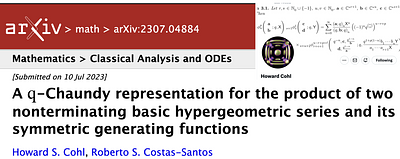By: Howard S. Cohl, Roberto S. Costas-Santos
We derive double product representations of nonterminating basic
hypergeometric series using diagonalization, a method introduced by Theo William Chaundy in 1943. We also present some generating functions that arise from it in the $q$ and $q$-inverse Askey schemes. Using this $q$-Chaundy theorem which expresses a product of two nonterminating basic hypergeometric
series as a sum over a terminating basic hypergeometric series, we study gener... more
We derive double product representations of nonterminating basic
hypergeometric series using diagonalization, a method introduced by Theo William Chaundy in 1943. We also present some generating functions that arise from it in the $q$ and $q$-inverse Askey schemes. Using this $q$-Chaundy theorem which expresses a product of two nonterminating basic hypergeometric
series as a sum over a terminating basic hypergeometric series, we study generating functions for the symmetric families of orthogonal polynomials in the $q$ and $q$-inverse Askey scheme. By applying the $q$-Chaundy theorem to $q$-exponential generating functions due to Ismail, we are able to derive alternative expansions of these generating functions and from these, new representations for the continuous $q$-Hermite and $q$-inverse Hermite polynomials which are connected by a quadratic transformation for the terminating basic hypergeometric series representations.
less
By: Howard S. Cohl, Roberto S. Costas-Santos
We study special values for the continuous $q$-Jacobi polynomials and present
applications of these special values which arise from bilinear generating
functions, and in particular the Poisson kernel for these polynomials.
We study special values for the continuous $q$-Jacobi polynomials and present
applications of these special values which arise from bilinear generating
functions, and in particular the Poisson kernel for these polynomials.
less

